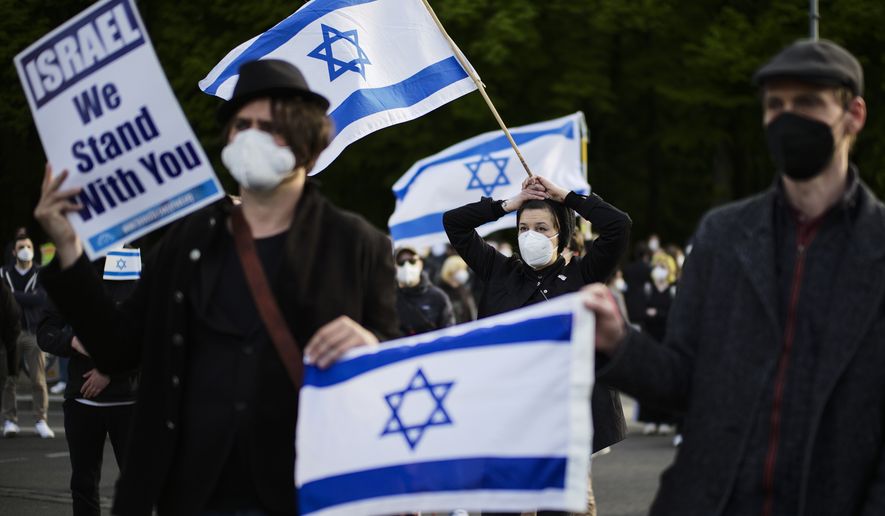Israel and Hamas agreed on Thursday to a cease-fire, bringing to at least a temporary halt to nearly two weeks of brutal fighting that have claimed hundreds of lives, shaken the Middle East, and sparked a heated debate in the U.S. about how strongly Washington should back Israel and its military operations in the future.
In a statement announcing the cease-fire, Prime Minister Benjamin Netanyahu’s office said it would pull back on its Gaza campaign after “great accomplishments” in the fight against Hamas, the militant Iran-backed Palestinian group that controls the densely populated Gaza Strip and is considered by the U.S. to be a terrorist organization.
But Israeli officials also made clear that they would resume the campaign of airstrikes targeting senior Hamas leaders and infrastructure such as tunnels and missile launching sites if Hamas continues firing rockets at civilian targets in Israel.
“The reality in the field will determine the continuation of operations,” Israeli Defense Minister Benny Gantz tweeted minutes after the deal was announced.
President Biden was under growing pressure internationally and from many in his own Democratic Party at home to rein in Israel, amid mounting death tolls and violence that spread to non-Hamas-controlled Palestinian lands on the West Bank.
In brief remarks after the agreement was announced, Mr. Biden “commended” Mr. Netanyahu and thanked Egyptian President Abdel Fattah el-Sissi for playing a major mediating role. He said his administration would pursue “quiet, relentless diplomacy” to make sure the cease-fire held and work with the Palestinian Authority, Hamas’ rival, in reconstruction efforts.
SEE ALSO: White House encouraged by reports of potential cease-fire in Middle East
The cease-fire is set to take effect later Thursday. It comes after a peace proposal put forth by Egypt, which has tried to act as a mediator throughout the crisis.
Taher Nounou, a Hamas official, confirmed the agreement.
“The Palestinian resistance will commit itself to this deal as long as the occupation is committed,” he told The Associated Press.
At least 230 Palestinians have been killed by Israeli rockets in the 11 days of fighting, according to officials in Gaza. At least 12 people in Israel have also died, including several children who were killed by Hamas rockets.
Hundreds of buildings in Gaza have been damaged or destroyed, including one facility that housed journalists for The Associated Press and other outlets. Israeli officials have steadfastly maintained that the building was also being used by members of Hamas.
Mr. Biden on Wednesday and Thursday spoke directly by phone with Mr. Netanyahu and U.S. officials said he has been pressuring the Israeli leader to cut a deal. Other governments in the Middle East and the United Nations this week also called for an end to the fighting, the worst since Israel and Hamas went to war in 2014.
The fighting began May 10 after clashes between Israeli police and Palestinian protesters at the Al Aqsa Mosque in Jerusalem. Those clashes led Hamas militants to begin a massive rocket bombardment of key Israeli cities. Most of the roughly 4,000 Hamas rockets were intercepted by Israel’s famed “Iron Dome” missile defense system, though several pierced the shield and led to civilian casualties.
Israel responded with regular airstrikes and at one point appeared on the verge of launching a major ground offensive into Gaza, though such a move did not materialize.
Back at home, Mr. Biden has tried to walk a fine line during the crisis. The White House has stressed its unwavering support for Israel’s right to self-defense against terrorist organizations such as Hamas, but the president has taken heat from some liberals in his party who believe Israel has unnecessarily escalated the bloodshed in Gaza.
A group of progressive lawmakers on Thursday introduced resolutions in both the House and Senate to block hundreds of millions of dollars in pending American weapons sales to Israel. Some liberals in Congress have argued more broadly that the U.S. uncritically supports Israel while turning its back on innocent Palestinians who have been killed or injured.
But Republicans say Democrats bear some of the blame. They argue that Mr. Biden’s willingness to negotiate with Iran — the prime financial sponsor of Hamas — and his reluctance to more forcefully back Israel have emboldened and increasingly well-armed Hamas.
“And every one of those rockets might as well have Joe Biden’s name written on the side of it, because it is his weakness, his appeasement, his moral relativism and ambiguity, his lack of backbone to stand up and stand with Israel that is causing this war in the Middle East,” Sen. Ted Cruz, Texas Republican, told Fox News on Wednesday evening.
• Ben Wolfgang can be reached at bwolfgang@washingtontimes.com.




Please read our comment policy before commenting.